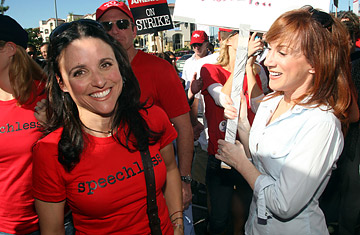
Actress Julia Louis-Dreyfus, left, and comedian Kathy Griffin picket in support of the Writers Guild of America, which went on strike for increased residuals from film and television profits in 2007
This again?
Just four months after a 100-day writers' strike ground Hollywood to a halt and cost the state of California more than $2 billion and 27,000 jobs, the movie business is once again facing the possibility of a strike — this time by actors. The anticipation of labor unrest in July has kept movie studios from starting production on any big films since April, while TV productions are working double-time to get as many episodes of their fall shows in the can as possible.
The issues (new-media and DVD residuals) are the same ones the writers fought over. But the actors are in the unique position of being represented by two unions that can't stand each other. Those unions — the Screen Actors Guild (SAG) and the smaller American Federation of Television and Radio Artists (AFTRA) — are negotiating their contracts with the Alliance of Motion and Picture Television Producers (AMPTP) separately for the first time in 27 years. AFTRA has reached an agreement that closely mirrors the one writers and directors approved earlier this year; its 70,000 members must vote to approve it by July 8. But SAG, taking a harder line, is still in negotiations with studios and appears to be far from reaching a deal for its 120,000 members by the time their contract expires June 30.
"What we're deciding here will affect actors for a generation," says Doug Allen, SAG's national executive director and chief negotiator. "The notion that the [Directors Guild of America], [Writers Guild of America] and SAG should all get the same deal is not fair. What's good for directors is not necessarily good for actors."
The long-simmering battle between the two unions escalated in March amid allegations that SAG was trying to poach actors from the soap opera The Bold and the Beautiful, which is under AFTRA jurisdiction. Now the fight has gotten to the hair-pulling stage: SAG is attempting to defeat AFTRA's contract vote, which would force the unions back to the bargaining table together. The latest weapon is dueling robo-calls: actor James Cromwell is calling AFTRA's members to support the contract. Sandra Oh is calling the 44,000 actors who are members of both unions to vote to defeat it.
"There's enormous anger against SAG in the industry because there's a feeling that they're not being realistic," says Jonathan Handel, a digital-media attorney at TroyGould in Los Angeles. Although none of the other unions have managed to obtain an increase in DVD residuals, SAG is still pushing for it. But because of the weak economy and the fresh memories of the writers' strike, Handel contends, "they don't have the leverage."
While the actors' unions continue to spar, studios are hedging their bets when it comes to productions. Executives at two movie studios said they had pushed back production start dates to late summer with the SAG negotiations in mind. If there is a strike, the thinking goes, better that it happen before a $100-million movie gets under way.
A special-effects-heavy movie, such as Transformers 2, could switch from filming actors to CGI work if a strike occurred. Meanwhile, one studio is planning a pre-emptive "super junket" for the press — the actors for several of its July and August films are doing their publicity now in case a strike prevents them from working later.
Several high-profile independent films, such as Bad Lieutenant, starring Nicolas Cage, and W, Oliver Stone's chronicle of the Bush presidency, are moving ahead with production, since they have negotiated separate deals with SAG.
How all this will influence TV is murkier. Some fall shows, like NBC's Heroes, ramped up production earlier than usual and have been at work since May. Others, like J.J. Abrams' much-anticipated new Fox show, Fringe, are about to start to production to deliver episodes for a big September promotional push. Fox would not comment on what a strike could mean for its Fringe plans.
Producers say the rancorous SAG negotiations have already hurt Hollywood. "A de facto strike is quickly shutting down production across the industry as SAG's Hollywood leadership stalls for time to pursue its campaign against AFTRA's new contract," says AMPTP spokesman Jesse Hiestand. "For each day that we are without an agreement, the losses continue to mount for the talent, crews, their families and the businesses that rely on the entertainment industry."
